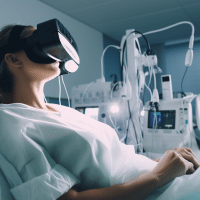The Psychology of VR: How Virtual Reality Affects Our Minds

Virtual Reality (VR) is an incredibly exciting and innovative technology that has the potential to revolutionize the way we interact with the world around us. By simulating a fully immersive environment, VR can transport us to new and exciting places, allowing us to experience things that were previously unimaginable.
But what is the psychology of VR? How does this technology affect our minds and emotions? The psychology of VR is a vast and fascinating field of study that delves into the intricacies of our brain’s response to virtual environments. It explores how our cognitive processes adapt to the virtual world, how our emotions are influenced and even amplified by the immersive experience, and how our behaviors may change as a result.
By understanding the psychology of VR, we can gain valuable insights into the potential applications and benefits of this technology. It provides us with an opportunity to improve our lives in various domains, such as education, healthcare, and entertainment. With a deeper understanding of how VR affects us psychologically, we can harness its power to create new and exciting experiences that enhance our well-being and open up endless possibilities for exploration and discovery.
Exploring the Psychology of VR
The psychology of virtual reality is a fascinating and rapidly evolving field of study. With each technological advancement, our understanding of how virtual reality impacts our minds deepens. Recent studies have revealed compelling insights into the profound effects that virtual reality can have on our emotions, behavior, and overall well-being.
For instance, research has demonstrated that immersive virtual reality experiences can effectively reduce stress and anxiety levels, enhance cognitive performance, and even aid in physical rehabilitation processes. These findings highlight the immense potential of virtual reality to revolutionize our interactions with the world around us.
As we delve further into the psychology of virtual reality, we can anticipate even more groundbreaking applications and innovative uses of this transformative technology. By continuously exploring and expanding our knowledge in this realm, there is no doubt that virtual reality will continue to reshape and redefine various aspects of our lives in unprecedented ways.

The Impact of Virtual Reality on Cognitive Processes
The psychology of VR is an incredibly fascinating and rapidly evolving field of study. As technology continues to advance at an unprecedented rate, our understanding of how VR impacts our cognitive processes deepens. Recent research has unveiled compelling insights into the profound effects VR can have on our thinking, memory, and information processing.
For instance, numerous studies have demonstrated that VR has the potential to significantly enhance our ability to recall and retain information. By immersing ourselves in virtual environments, we engage multiple senses and create powerful associations that aid in memory consolidation. Moreover, VR has shown promise in improving our focus, concentration, and attention span, enabling us to better absorb and process complex information.
One of the most intriguing aspects of VR is its ability to provide us with a unique window into understanding complex concepts and phenomena. Through immersive experiences, we can visualize and interact with abstract ideas, making them more tangible and comprehensible. Furthermore, VR has the potential to enhance our emotional intelligence by allowing us to explore and experience a wide range of emotions in a controlled and safe environment.
Best VR Games of This Year – Explore Around!
A Guide to Getting Started: Playing Fallout 4 VR on Different Platforms
As VR technology continues to rapidly evolve and become more accessible, its impact on our cognitive processes is poised to become increasingly pronounced. The potential applications and benefits of VR in various domains, such as education, therapy, and entertainment, are vast and captivating. By delving deeper into the psychology of VR, we can unlock its full potential and harness its transformative power for the betterment of society.
The Role of Presence in Virtual Reality
The psychology of VR is a fascinating and rapidly evolving field of study that delves into the intricate workings of the human mind and behavior in immersive digital environments. As VR technology continues to advance at an astonishing pace, researchers are tirelessly exploring the multifaceted ways in which it impacts our cognitive processes, emotions, and actions.
At the heart of the VR experience lies the crucial concept of presence, which encapsulates the sensation of being fully engaged and enveloped within a virtual world. This feeling of presence is instrumental in shaping the overall effectiveness and realism of a VR encounter, as it profoundly influences how users interact with the virtual environment and how they respond to the stimuli presented within it.
Whether it’s the awe-inspiring landscapes, the intricate details of virtual objects, or the dynamic interactions with virtual characters, the sense of presence is a pivotal factor in shaping our perceptions and reactions in the virtual realm.
By delving deeper into the complexities of presence in VR, we can unravel the intricate mechanisms that underlie the immersive experience. Through this understanding, we gain valuable insights into how virtual reality profoundly impacts our minds, emotions, and behaviors. Consequently, this knowledge empowers us to harness the transformative potential of VR technology in various domains, such as education, healthcare, entertainment, and beyond.
In conclusion, the exploration of the psychology of VR unveils an exciting frontier of research that allows us to delve into the profound ways in which digital immersion influences our cognitive processes, emotions, and actions. By unraveling the mysteries of presence in VR, we can unlock new possibilities and leverage the immense power of virtual reality to enhance our understanding of the human mind and behavior.
The Effects of Virtual Reality on Emotional Responses
The psychology of VR is an incredibly fascinating and rapidly evolving field of study. As technology continues to advance, our understanding of how VR impacts our emotional responses deepens. Recent studies have demonstrated that VR has the remarkable ability to create immersive experiences that elicit powerful and profound emotional reactions.

For instance, VR can be effectively employed to simulate traumatic events, enabling users to confront their fears within a safe and controlled environment. This innovative approach facilitates emotional processing and enhances individuals’ comprehension of their own psychological responses. Moreover, VR has the potential to generate positive experiences such as virtual vacations or simulated adventures, which can effectively alleviate stress and anxiety.
By delving further into the psychology of VR, we unlock the immense potential of this technology to create impactful and meaningful experiences that significantly contribute to our emotional well-being. Through ongoing research and exploration, we continue to expand our knowledge and uncover new possibilities in this exhilarating realm.
The Impact of Virtual Reality on Memory
The psychology of virtual reality is an exciting and rapidly evolving field of study that delves into the intricate workings of the human mind when immersed in virtual environments. With advancements in technology, our understanding of how virtual reality impacts our cognitive processes continues to expand.
VR Nature Escapes: A Digital Journey into the Wild
Recent research has shed light on the profound impact virtual reality can have on our memories. By immersing ourselves in a virtual world, we can create vivid and immersive experiences that possess the potential to linger in our minds for years to come. These memories, formed within the realm of virtual reality, can be particularly beneficial for individuals with memory impairments, as they have the power to strengthen and reinforce their recollection abilities.
Moreover, virtual reality is emerging as a valuable tool for memory recall. By simulating past experiences in a safe and controlled environment, individuals can relive moments from their personal history, fostering a deep sense of nostalgia and connection. This innovative use of virtual reality not only provides a unique opportunity for reminiscence but also serves as a therapeutic approach to engage with cherished memories.
As virtual reality technology continues to advance and evolve, so too does our understanding of its profound impact on memory processes. Through ongoing research and exploration, we are constantly uncovering new insights into the intricate relationship between virtual reality and the human memory system.
The Potential Benefits of Virtual Reality Therapy
The psychology of VR is an incredibly fascinating and innovative field of study that is rapidly gaining momentum in the world of mental health. With the use of VR technology, therapists and researchers are exploring new avenues for treating a wide range of mental health issues. VR therapy has shown promising results in the treatment of various conditions such as anxiety, depression, post-traumatic stress disorder (PTSD), and phobias.
By immersing patients in a virtual environment, VR therapy provides a unique opportunity to confront fears and anxieties in a safe and controlled setting. This allows individuals to gradually expose themselves to their fears, helping them build resilience and overcome their challenges. The controlled nature of VR therapy enables therapists to tailor the experience to each patient’s specific needs, ensuring a personalized and effective treatment approach.
Moreover, VR therapy goes beyond exposure therapy by offering additional benefits. It can assist patients in developing coping skills and strategies to better manage their mental health issues. Through guided experiences in the virtual world, individuals can practice and refine their coping mechanisms in a supportive environment. This empowers them to gain insights into their mental health issues and acquire the necessary tools to navigate their daily lives more effectively.
In conclusion, the integration of VR technology in mental health treatment represents a remarkable advancement in the field. It holds immense potential to revolutionize therapy by providing innovative and immersive experiences that enhance patient outcomes. As the field continues to evolve, the psychology of virtual reality promises to contribute significantly to the well-being and recovery of individuals facing mental health challenges.

Virtual reality (VR) has the incredible potential to revolutionize the way we interact with and perceive the world around us. By immersing ourselves in a simulated environment, VR has the power to transform our cognitive processes, emotional responses, and even shape our memories. In this thought-provoking article, we delved into the fascinating realm of VR psychology, exploring the profound impact of presence on our overall experience and delving into the promising realm of VR therapy.
It becomes increasingly evident that VR holds the key to unlocking a world of possibilities when it comes to improving our mental health and overall well-being. As we venture further into the uncharted territories of VR, it becomes crucial to carefully consider the ethical implications of this technology and ensure its responsible usage. With the right safeguards in place, VR can truly become an invaluable tool that not only enhances our lives but also paves the way for a brighter and more promising future.


















